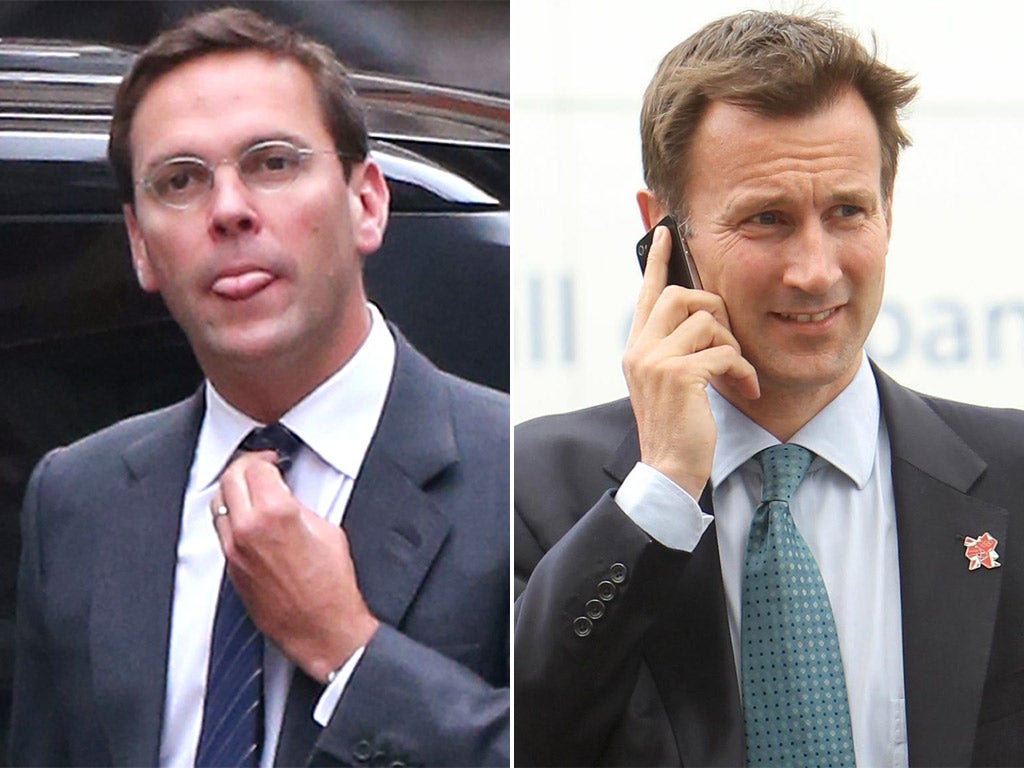Murdoch's evidence shows Jeremy Hunt secretly passed information on BSkyB bid

The Culture Secretary, Jeremy Hunt, was battling to save his political career last night after it was revealed that his office was secretly passing information to the Murdochs during their £7.5bn bid to take over BSkyB.
Mr Hunt faced demands for his resignation after hundreds of pages of explosive emails, released by News Corp to the Leveson Inquiry, showed his political advisers engaged in frequent briefing of the Murdochs' chief lobbyist to help get the deal through – despite Mr Hunt's claim to have acted impartially.
One email quoted Mr Hunt saying "we'd get there in the end" and that he "shared" News Corp's objective of taking over the broadcaster. Another email, sent by News Corp's lobbyist the day before Mr Hunt made a statement to Parliament on the bid, drew gasps when read out: "Managed to get some infos on the plans for tomorrow (although absolutely illegal...!)"
In a day of dramatic revelations at the inquiry, where James Murdoch gave evidence under oath, it also emerged that:
l Mr Murdoch did discuss News Corp's bid for BSkyB with the Prime Minister over Christmas dinner in 2010 at the Oxfordshire home of Rebekah Brooks – contradicting Downing Street's previous denials.
l Emails sent by James Murdoch's lobbyist Fréd Michel show that Mr Hunt's office would regularly update News Corp on the progress of its bid and how to get it past the regulators.
l News Corp threatened Mr Hunt that it would withdraw the bid if he did not hurry things along. "JH repeated he was definitely keen to see this through as quickly as possible."
The emails directly contradicted assurances that Mr Hunt had given the House of Commons that he was acting as an independent adjudicator of the bid in a quasi-judicial role, Labour said. The Labour leader, Ed Miliband called on Mr Hunt to resign.
The emails also shed light on the extensive and unsuccessful efforts the firm undertook to lobby the Business Secretary, Vince Cable, to approve the deal.
The memos also reveal that Rupert Harrison, George Osborne's special adviser, was contacted for discussions about what Mr Cable's thinking might be.
Mr Hunt told the Commons in June 2011: "I am deciding this deal on a quasi-judicial basis, but I have not met Rupert Murdoch or James Murdoch in recent weeks, and all the meetings I have had with them have been done through official channels."
Last night Downing Street said Mr Cameron supported Mr Hunt but pointedly did not express confidence in the process followed by the Department of Culture in deciding the bid. In a statement last night Mr Hunt said he had to bring forward his evidence to the Leveson Inquiry to clear his name. "Now is not a time for knee-jerk reactions," he said. "I asked for advice from independent regulators – which I didn't have to do – and I followed that advice to the letter."
Join our commenting forum
Join thought-provoking conversations, follow other Independent readers and see their replies
Comments
Bookmark popover
Removed from bookmarks